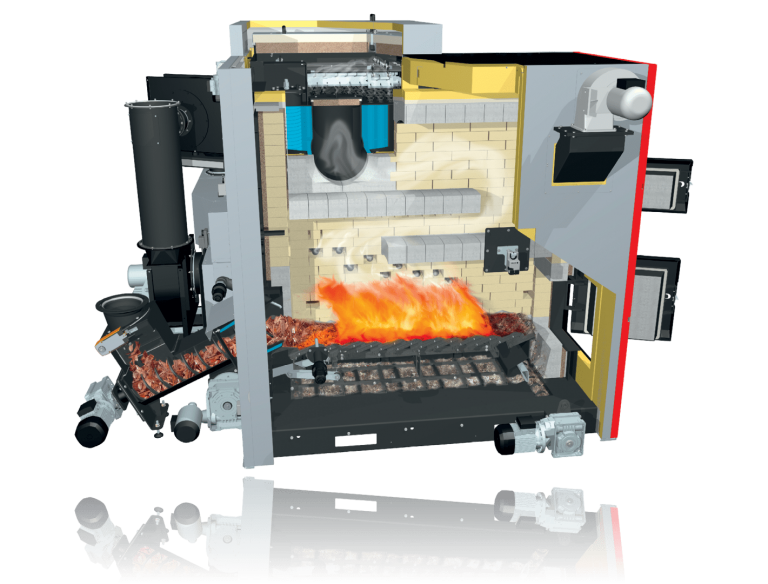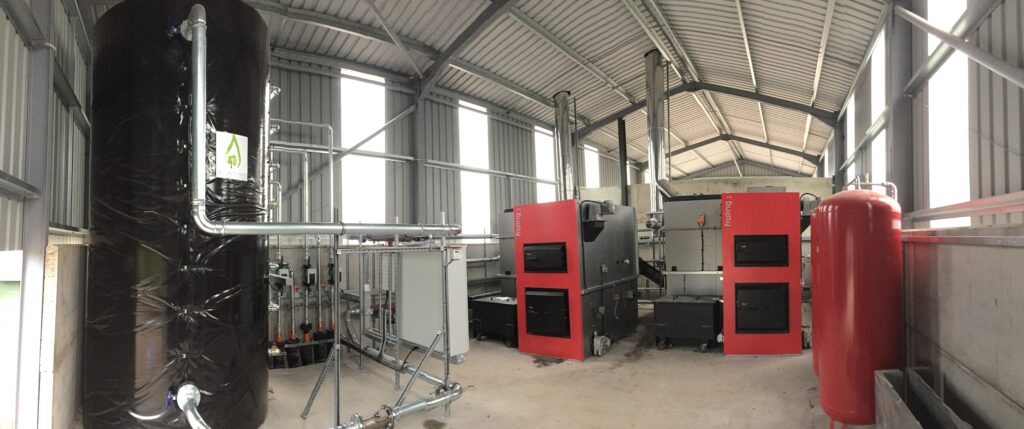Biomass Boilers
Our highly efficient biomass boiler plants provide on-demand space heating and hot water using carbon-neutral timber fuel.
Designed to meet your needs | No more fossil fuel dependency

How does a biomass boiler work?
Biomass boilers work in the same way as a traditional fossil fuel burner, combusting fuel in a chamber to produce heat. Our solutions use automated fuel delivery which moves woodchip or pellets from a fuel store to the biomass boiler’s combustion chamber.
An igniter blows hot air into the chamber to ignite the fuel. Biomass boilers differ from open fires as they burn timber fuel at a very high temperature, causing it to go through a process called gasification.
The hot gases rise from the combustion chamber through a flue and pass through a heat exchanger, which transfers the heat to the water used in the property’s heating system. Any heat that isn’t called for instantly is stored in a buffer tank (also called a thermal store) which stores heat until it is called for by the secondary side of the heating system.
Benefits
Affordable Heating Fuel
Whilst woodfuel prices can vary, it's often cheaper than other heating options.
Domestic - Financial Support
Domestic biomass boiler installations can benefit from the Renewable Heat Incentive.
Agriculture - Healthier Animals
Biomass boilers are ideal for agricultural application, our dairy farm customers have reduced their bactoscan levels to single figures.
Lower Carbon Emissions
Sourcing local wood fuel minimises the carbon emissions created by its cultivation, manufacture and transportation.
Guide to Biomass Boilers
Biomass boilers gasify timber fuel to create an intense heat that can provide hot water and heating for entire buildings (even communities). Whereas stoves rely on the heat emitted from burning wood to heat a room.
Logs are typically used for smaller biomass boiler systems in a domestic setting. Seasoned or force dried logs can be stored easily and are readily available – some may even have access to free logs. Log boilers have to be loaded manually and tend to require more frequent maintenance.
Wood pellets are ideal for domestic dwellings or smaller commercial spaces. Made by compressing sawdust and fine wood shavings, pellets have a high calorific value, which means you get more energy per kg of pellets than log or wood chip. Our pellet boiler solutions use automated mechanical or suction feeds to transport the fuel from a store to the boiler’s combustion chamber so no manual loading is required.
Wood chips are best suited to sites with a higher heat demand and space to store larger quantities of fuel. Wood chip tends to be more locally obtainable and competitively priced than wood pellets, which not only benefits your local economy but also reduces the carbon emissions created from transporting the fuel. Our wood chip boiler solutions use automated feeds to transport the fuel from a store to the boiler’s combustion chamber.
Whilst there are some companies that now offer deliveries of pellets anywhere in mainland UK, wood chip and log supply is more variable.
Systems receiving payments from the UK government’s RHI scheme must source their fuel from a supplier on the BSL (Biomass Suppliers List) to comply with the scheme’s rules.
BSL suppliers must prove that their fuel comes from woodland that is sustainably managed and that the gas emissions generated from the cultivation, processing and transport of their biomass fuel are at least 60% lower than the EU fossil fuel average for heat.
Biomass boilers are larger than their fossil fuel equivalents and the storage of fuel requires covered storage.
A 7kW boiler can measure around 1240 x 650mm whilst a 1MW boiler will be almost 4m tall.
Our biomass boiler solutions can be designed to meet your heat requirements and fit the space you have.
A biomass boiler system will need a flue that meets building regulations part J. This could be an existing chimney, but more often than not a new stainless steel flue pipe will need to be installed.
In many cases planning permission isn’t required as biomass heating plants are placed into existing buildings. However, if you need to build a structure to house the system you should check with your local planning authority before proceeding.
If you are having a new flue installed this may also require planning permission if the top of the flue sits more than one metre above the highest part of the property’s roof.
What We Can Do For You
With over a decade of mechanical heating experience and an expansive range of projects from domestic log boilers to large scale industrial biomass heating plants, you’re in safe hands with Shaw Renewables.
We provide turn key solutions, designing the right system for the application, procuring high quality, tried and tested equipment that is then skilfully installed by our engineers who have been trained to the highest standards by biomass boiler manufacturers.

Request a callback
If you want to get a quote or simply ask a question, fill in your details on our Contact Page.